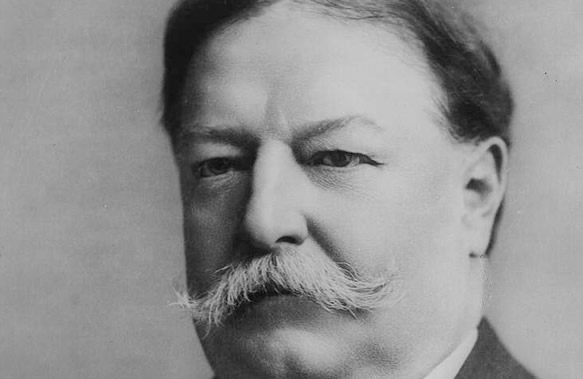William Howard Taft |
|||||
 |
|||||
William Howard Taft was born on September 15, 1857, in Cincinnati, Ohio . He had four brothers and sisters. His father, Alphonso Taft, served as Secretary of War under Ulysses S. Grant. William attended Yale University where he became a member of the Skull and Bones secret society, co-founded by his father in 1832. Taft graduated at the top of his class and attended Cincinnati Law School. In 1886, he married his high school sweetheart Helen Herron. The next year, he was appointed judge of the Ohio Superior Court. His political career began in 1890 after he was appointed Solicitor General by President Benjamin Harrison. From 1901 to 1903, he reluctantly served on a committee established by President William McKinley to establish a civilian government in the newly acquired Philippines. Taft was soon named Governor-General and became very popular among American and Filipinos. In 1904, President Theodore Roosevelt appointed him as Secretary of War. In this position, Taft helped supervise the building of the Panama Canal, served as Secretary of State, and even took on presidential duties when Roosevelt was abroad. With support from Theodore Roosevelt, Taft ran for President in 1909. Taft easily won the election becoming the country's 27th president, defeating William Jennings Bryan, who had been defeated twice by President McKinley, before losing again. Taft’s presidency was highlighted by his strengthening of the Interstate Commerce Commission, expansion of the Civil Service, and his establishment of a postal savings bank and parcel post system. He also supported the passage of the 16th Amendment (federal income tax on corporations) and the 17th amendment (direct election of Senators by the people). Nevertheless, his presidency is best-known for his blunders in dealing with the nation's business community. Lacking the charisma and charm of his mentor, Theodore Roosevelt, he quickly lost the support of the business community by launching anti-trust law suits against 80 different companies, including U.S. Steel (one of the nation's largest corporations) and made numerous enemies in high places. Furthermore, his support of the Payne-Aldrich Tariff Act of 1909, which failed to lower the tariff to a level acceptable to most reformers, further alienated liberal Republicans. In 1913, Taft was defeated in his bid for a second term by Virginian Woodrow Wilson. In the election, Taft won only eight electoral votes, marking the worst defeat for a president seeking a second term in office in American history. After his term in office, Taft was appointed as a professor at the Yale University School of Law and then, as president of the American Bar Association. In 1921, President Warren G. Harding nominated him as Chief Justice of the Supreme Court. After confirmation in the Senate, Taft became the only President to have ever served as Chief Justice. He served as Chief Justice for nine years and considered the appointment his greatest life accomplishment; allegedly remarking, "I don’t ever remember being president." Only five weeks after retiring as Chief Justice, Taft died. He was the first President to be buried at Arlington National Cemetery. Today, Taft is a central figure in two enduring legends: 1.) According to legend, the seventh-inning stretch in baseball was born when Taft got up to stretch in between the top and bottom of the seventh inning during a Chicago Cubs game. The crowd, out of respect to the President, stood up to stretch with him and the practice has endured ever since. 2.) William Howard Taft was the heaviest President. One night, he became stuck in the White House bathtub. According to legend, it took six aides and a gallon of butter to dislodge him. As a result, a new bathtub was built which remains the largest bathtub in America. |
|||||
Full Presidential Biographies |
|||||
| Click a president to learn more! | |||||
 |
 |
 |
 |
 |
 |
 |
 |
 |
 |
 |
 |
 |
 |
 |
 |
 |
 |
 |
 |
 |
 |
 |
 |
 |
 |
 |
 |
 |
 |
 |
 |
 |
 |
 |
 |
 |
 |
 |
 |
 |
 |
 |
 |
||||